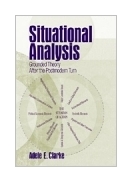|
||
• wydawnictwa polskie
• Zamów informacje o nowościach z wybranego tematu • kontakt
• Cookies na stronie |
SITUATIONAL ANALYSISA.CLARKEwydawnictwo: SAGE , rok wydania 2005, wydanie Icena netto: Description: Situational Analysis: Grounded Theory After the Postmodern Turn provides an innovative approach to grounded theory useful in a wide array of qualitative research projects. Extending Anselm Strauss's ecological social worlds/arenas/discourses framework, situational analysis offers researchers three kinds of maps that place emphasis on the range of differences rather than commonalities, as found via the traditional grounded theory approach: - Situational maps lay out the major human, nonhuman, discursive, and material elements
in the research situation of concern and provoke analysis of relations among them Using extensive examples, author Adele E. Clarke covers why and how to do these maps with traditional qualitative data such as interviews and ethnographic materials. The book then follows in Foucault's footsteps, offering ambitious chapters on mapping and analyzing discourse materials-narrative, visual, and historical. Situational analysis helps researchers examine variations, differences, silences in data, conditionality, and complexity. It is also very useful for multi-site research projects, which are increasingly common not only in the social sciences but also in the humanities and related professional fields. Situational Analysis can be used in a wide array of research projects
that draw on interview, ethnographic, historical, visual, and other discursive materials
including multi-site research. It is a perfect supplement to any graduate-level
qualitative research course, and will also support professional researchers and
consultants from diverse backgrounds pursuing qualitative projects. "With passion and bravura Situational Analysis maps
the structures, discourses, and silences hidden in qualitative research. Adele Clarke
offers the best of both worlds: a theoretically grounded methodology and a
methodologically useful theory. This book is a must read for every researcher
contemplating a study of people doing things together." Table of Contents:
408 pages Paperback Księgarnia nie działa. Nie odpowiadamy na pytania i nie realizujemy zamówien. Do odwolania !. |


